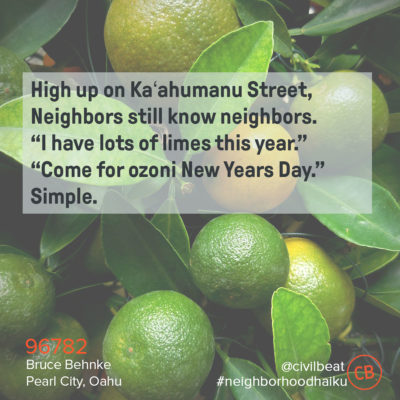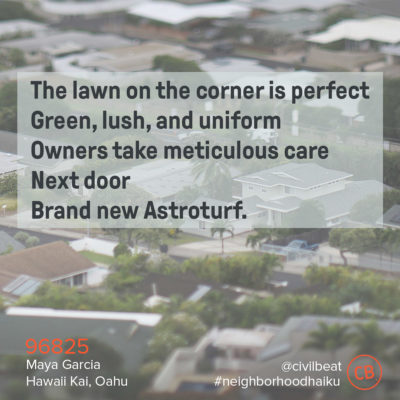Civil Beat鈥檚 first neighborhood haiku poetry contest is off and running. We asked readers to share their ZIP code haikus about their neighborhoods and the entries started pouring in.
We鈥檝e received hundreds of poems representing 58 different ZIP codes. The majority came from Oahu and Hawaii Island, one from Lanai, one from Kalaupapa on Molokai, and the rest from Maui, Kauai and a handful from the mainland.
So why did we decide to do this? This was our chance to learn more about where our readers actually live and how they view their own neighborhoods.
Our contest was inspired by WLRN-Miami Herald and the O, Miami poetry festival鈥檚 collaborative poetry contest 鈥淥de to your Zipcode.鈥� They asked their listeners to write poems where each digit determined the number of words per line.
Because all of Hawaii鈥檚 ZIP codes start with 9 and 6, we switched it up a bit and had our digits represent the syllable count of each line instead of words, inspired by the traditional 5-7-5 syllable haiku format. The response has been amazing.
Although most of us need a plane to travel from one island to the other, we all seem to be closely connected through tasty local food, love of pidgin, breathtaking views, kind neighbors, crowds of tourists, routine traffic and 鈥渃acophonous鈥� chickens.
This poem by Bruce Behnke of Pearl City highlights the generosity of Hawaii鈥檚 neighbors.

When asked why he decided to write a neighborhood haiku Behnke said, 鈥淵our call for entries was an opportunity to reflect positively on Hawaii — and the small but special things that make it such a good place to live. It’s easy to get caught up in the issues of the day, but it’s nice to step back from that for a few moments.鈥�
That鈥檚 exactly what we were hoping for. We like to picture each of you taking a short break from your daily grind to reflect on the small particulars that make your neighborhood special.
Maya Garcia, an english teacher at Mid-Pacific Institute, assigned the Neighborhood Haiku activity as homework to her freshman class after she submitted two haikus of her own about Hawaii Kai, one winning a spot on Civil Beat’s homepage where we have been publishing a new winner each day for the past week or so.

“This poetry challenge helped remind students about the power of imagery in written work and that precise word choice enhances clarity,” she said.
Garcia’s class had just finished reading Part 1 of Harper Lee’s, “To Kill A Mockingbird.”
“I reminded them that Lee provides a great deal of information about the community in Maycomb. These details describe a very specific place, one that provides the underpinning for this story. Then I mentioned that each one of them also goes home to a very specific place, one that provides the setting for their own stories.”
Garcia shared the idea with her colleague, Ken Baldino, who also loved the concept and used it as an in-class assignment. The poems will be posted in the school’s hallway and over 30 of their students have officially submitted their poems to Civil Beat’s contest. We’ll be publishing some next week.
If you’ve been enjoying the daily haikus and would like to hear the authors read them in person, please attend our event on Dec. 11 from 6 p.m. to 7:30 p.m. at Ka Waiwai, 1110 University Ave.
The Neighborhood Haiku poetry contest runs through Nov. 22. All winners will be published on Civil Beat and shared on our social media channels. Submit your own Neighborhood Haiku through .
 Sign up for our FREE morning newsletter and face each day more informed.
Sign up for our FREE morning newsletter and face each day more informed.
We need your help.
Unfortunately, being named a聽finalist for a聽Pulitzer prize聽doesn’t make us immune to financial pressures. The fact is,聽our revenue hasn鈥檛 kept pace with our need to grow,听.
Civil Beat is a nonprofit, reader-supported newsroom based in 贬补飞补颈驶颈. We鈥檙e looking to build a more resilient, diverse and deeply impactful media landscape, and聽we hope you鈥檒l help by .

